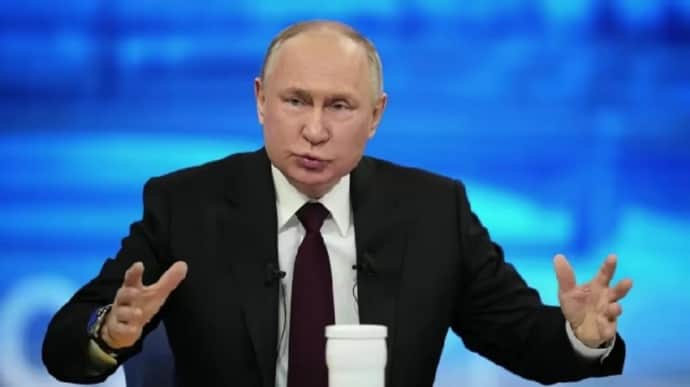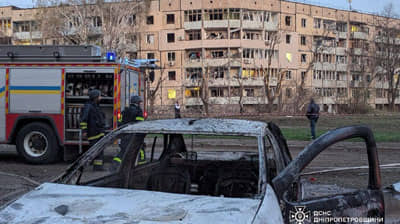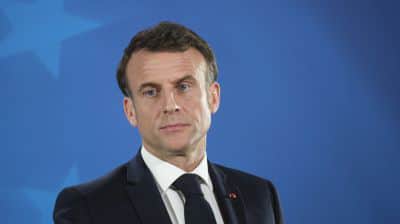Putin starts talking about nukes whenever West provides Ukraine with aid packages – ISW

Russian leader Vladimir Putin has started talking about resuming production of medium- and short-range missiles. ISW analysts said that in this way, he is trying to influence the West's decisions, especially at key moments of political discussions about military assistance to Ukraine.
Source: Institute for the Study of War (ISW)
Details: On 28 June, Russian leader Vladimir Putin directed the commencement of production and deployment of short- and intermediate-range nuclear missiles. This decision follows the United States' exit from the Intermediate-Range Nuclear Forces (INF) Treaty in 2019.
The ISW noted that this move is likely part of the Kremlin's reflexive control strategy, designed to influence Western decision-making in Russia's favour.
At a Russian Security Council meeting, Putin emphasised that Russia had adhered to the INF Treaty's restrictions on ground-launched intermediate-range missiles until the United States supposedly violated these terms. He now argues that Russia must also produce and deploy such missile systems.
The US suspended its involvement in the INF Treaty on 1 February 2019 and officially withdrew on 2 August 2019, citing Russia's breaches related to the development, testing, and deployment of intermediate-range missiles. In response, Russia suspended its participation on 2 February 2019.
Putin highlighted two specific US military exercises in 2024: one with the Philippines in Northern Luzon on 11 April, and another with Denmark near Bornholm on 3-5 May. These exercises featured the Typhoon medium-range missile launcher, with which the US states can deploy SM-6 and Tomahawk missiles. The SM-6 has a range of up to 370 kilometres, while the Tomahawk can reach approximately 2,500 kilometres. However, US officials did not confirm which missiles, if any, were used in these exercises.
It appears that Putin is using these exercises as a justification for his broader strategy of reflexive control, aimed at disrupting Western military assistance to Ukraine. The exercises involved launchers capable of deploying missiles that could pose various threats to Russia from the exercise locations. For instance, Bornholm Island is about 300 kilometres from Russia’s Kaliningrad Oblast and roughly 1,400 kilometres from Moscow.
The US Sixth Fleet clarified that the Bornholm exercise involved transporting a Typhoon launcher from land to shore as part of convoy defence training, suggesting shorter-range weapons were likely used. Northern Luzon, the closest area of the Philippines to Russia's southwest of Vladivostok, is approximately 2,800 kilometres away, beyond the range of Tomahawk missiles.
Putin's remarks came after China's delayed condemnation of the US drills in Northern Luzon on 30 May. He likely referenced the Philippine exercises to bolster his position with China, North Korea, and Vietnam, as he seeks to forge a coalition of states in support of a new "Eurasian security architecture."
To quote the ISW’s Key Takeaways on 28 June:
- Russian leader Vladimir Putin directed on 28 June the production and deployment of nuclear-capable short- and intermediate-range missiles following the American withdrawal from the Intermediate-Range Nuclear Forces (INF) treaty in 2019, likely as part of the Kremlin's ongoing reflexive control campaign to influence Western decision making in Russia's favour.
- Ukrainian forces reportedly struck an oil depot in Russia on 28 June and reportedly struck a microelectronics plant and a military unit on the night of 27-28 June.
- The Ukrainian Armed Forces Centre for Strategic Communications (StratCom) reported on 28 June that Ukrainian forces have damaged or destroyed more than 30 Russian military aircraft in the first six months of 2024, although ISW cannot confirm this report fully.
- Many Russian elites have reportedly shifted from criticising Russia's war effort in Ukraine to supporting it because they assess that Russia is prevailing.
- Russian officials called for harsher punishments in Russia's criminal system, likely in response to the recent terrorist attacks in Dagestan.
- Russia may be creating a shadow fleet to transport Russian liquified natural gas (LNG) and circumvent Western sanctions.
- Ukrainian forces recently regained lost positions near Vovchansk and Kreminna, and Russian forces recently advanced near Chasiv Yar.
- Russian opposition outlet Vazhnye Istorii used Federal State Statistics Service (Rosstat) data to estimate that over 71,000 Russian men were killed in the war in Ukraine in 2022 and 2023.
Support UP or become our patron!





